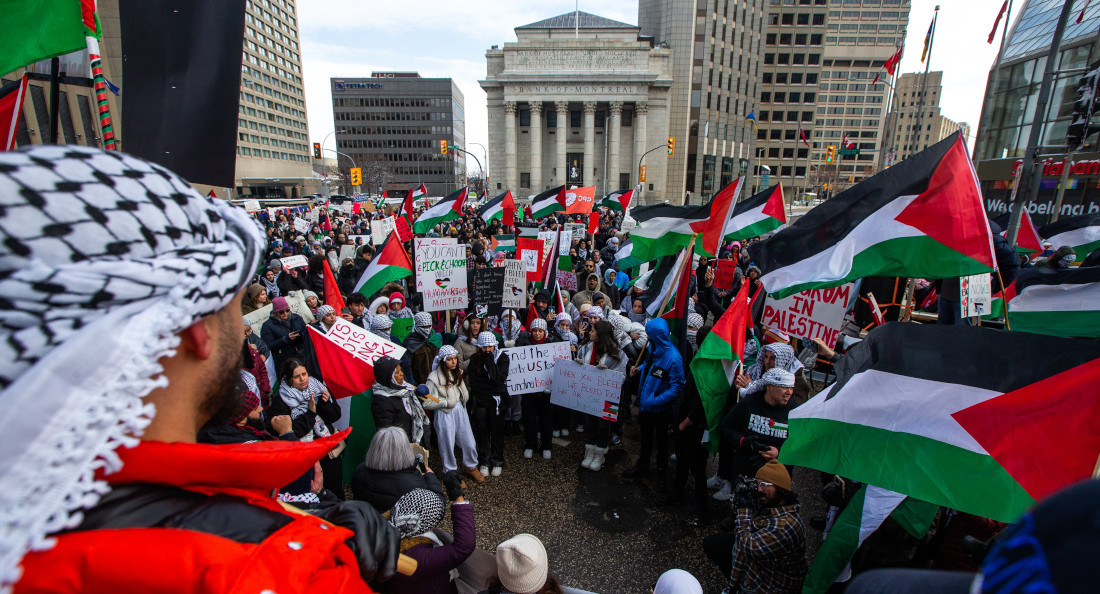Silence=death
Why queer people must speak out against pinkwashing
During the AIDS epidemic, queer organization ACT-UP popularized the slogan “Silence=Death” to show that the public pressure to not speak about AIDS was leading to the deaths of queer people who were left without resources or support. Many queer activists have recently used the slogan to show that queer silence is complicity with Israel’s mass killing of Palestinians.
Speaking out against Israel’s occupation of Palestine, and what some human-rights experts are calling a genocide in Gaza, we, as trans people, have often been met with hostile claims about Palestinians’ supposed homophobia.
At protests, or as we have walked around simply wearing keffiyehs, opponents have approached us to gleefully describe their fantasies of Palestinians subjecting us to extreme violence because we are queer and trans. These statements are sometimes followed by exaggerations about the legal rights of queer people in Israel, with no mention of the current government’s anti-queer stances.
We’ve heard this narrative from hardline supporters of Israel counterprotesting pro-Palestine rallies and vigils, from politicians such as Ben Carr, and, sadly, from other queer people.
The narrative of supposed Israeli acceptance of queers and supposed Palestinian bigotry toward us is a tactic called pinkwashing. The state of Israel and its allies, including Canada, use pinkwashing to frame basic assumptions about the Israeli occupation of Palestine.
The narrative that Israel supports queers while Palestinians reject us is untrue, and it erases the voices of queer Palestinians. Israel has blackmailed queer Palestinians and does not spare queer people in their bombing campaigns in Gaza. In our experience, the Palestinian community of Winnipeg has shown hospitality and solidarity with queers, including ourselves, who show up in support of Palestine.
An image is currently circulating of an IDF soldier holding a rainbow flag over a bombed-out neighbourhood in Gaza. Queer people must speak out when we see our identities used to celebrate and justify genocide. We have a responsibility to speak out against pinkwashing in our own communities and beyond, and to stand in solidarity with Palestine.
Some queers see inclusion and representation in the status quo as the hallmark of liberation, ignoring the fact that many countries with repressive policies toward queer people are former settler-colonies and have those policies as remnants of an imposed colonial legal framework.
There is a different vision for what queer community can look like. “Queer” is a broad term including many different expressions of sexuality and gender identity. Queer people come from a wide range of class and racial backgrounds. Our diverse identities – within the queer umbrella, and including race, class, disability, et cetera – mean that any two queer people may have few common experiences, but we find community together across our differences.
The queer ideal of solidarity in spite of differences opens up the possibility for queer solidarity across identities and across borders.
Queer communities often focus their politics in a narrow way: advocating for legal rights and marriage equality. But for the queer community to experience liberation, we must embrace a wider understanding of solidarity.
This is why we organize as queer people for Palestinian freedom, for an end to occupation, colonialism and genocide. Queer liberation demands that we recognize that an injury to one is an injury to all.
Misha Stone and Simon Pensato are members of Queers for Palestine - Winnipeg. They live together, with a cat, on Treaty 1 territory.
Published in Volume 78, Number 12 of The Uniter (November 30, 2023)







